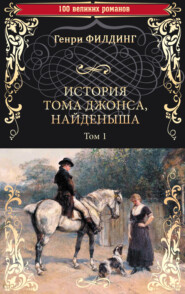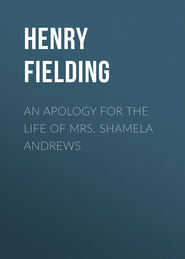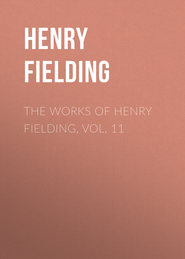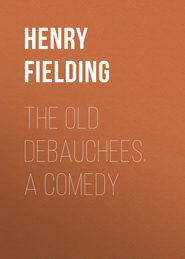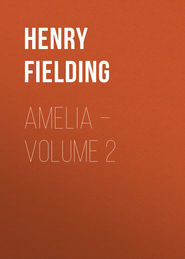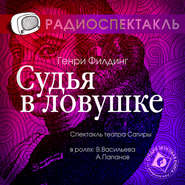По всем вопросам обращайтесь на: info@litportal.ru
(©) 2003-2024.
✖
Joseph Andrews, Vol. 1
Настройки чтения
Размер шрифта
Высота строк
Поля
Adams was now gone some minutes, having insisted on Joseph's beginning the journey on horseback, and Joseph had his foot in the stirrup, when the hostler presented him a bill for the horse's board during his residence at the inn. Joseph said Mr Adams had paid all; but this matter, being referred to Mr Tow-wouse, was by him decided in favour of the hostler, and indeed with truth and justice; for this was a fresh instance of that shortness of memory which did not arise from want of parts, but that continual hurry in which parson Adams was always involved.
Joseph was now reduced to a dilemma which extremely puzzled him. The sum due for horse-meat was twelve shillings (for Adams, who had borrowed the beast of his clerk, had ordered him to be fed as well as they could feed him), and the cash in his pocket amounted to sixpence (for Adams had divided the last shilling with him). Now, though there have been some ingenious persons who have contrived to pay twelve shillings with sixpence, Joseph was not one of them. He had never contracted a debt in his life, and was consequently the less ready at an expedient to extricate himself. Tow-wouse was willing to give him credit till next time, to which Mrs Tow-wouse would probably have consented (for such was Joseph's beauty, that it had made some impression even on that piece of flint which that good woman wore in her bosom by way of heart). Joseph would have found, therefore, very likely the passage free, had he not, when he honestly discovered the nakedness of his pockets, pulled out that little piece of gold which we have mentioned before. This caused Mrs Tow-wouse's eyes to water; she told Joseph she did not conceive a man could want money whilst he had gold in his pocket. Joseph answered he had such a value for that little piece of gold, that he would not part with it for a hundred times the riches which the greatest esquire in the county was worth. "A pretty way, indeed," said Mrs Tow-wouse, "to run in debt, and then refuse to part with your money, because you have a value for it! I never knew any piece of gold of more value than as many shillings as it would change for." – "Not to preserve my life from starving, nor to redeem it from a robber, would I part with this dear piece!" answered Joseph. "What," says Mrs Tow-wouse, "I suppose it was given you by some vile trollop, some miss or other; if it had been the present of a virtuous woman, you would not have had such a value for it. My husband is a fool if he parts with the horse without being paid for him." – "No, no, I can't part with the horse, indeed, till I have the money," cried Tow-wouse. A resolution highly commended by a lawyer then in the yard, who declared Mr Tow-wouse might justify the detainer.
As we cannot therefore at present get Mr Joseph out of the inn, we shall leave him in it, and carry our reader on after parson Adams, who, his mind being perfectly at ease, fell into a contemplation on a passage in Aeschylus, which entertained him for three miles together, without suffering him once to reflect on his fellow-traveller.
At length, having spun out his thread, and being now at the summit of a hill, he cast his eyes backwards, and wondered that he could not see any sign of Joseph. As he left him ready to mount the horse, he could not apprehend any mischief had happened, neither could he suspect that he missed his way, it being so broad and plain; the only reason which presented itself to him was, that he had met with an acquaintance who had prevailed with him to delay some time in discourse.
He therefore resolved to proceed slowly forwards, not doubting but that he should be shortly overtaken; and soon came to a large water, which, filling the whole road, he saw no method of passing unless by wading through, which he accordingly did up to his middle; but was no sooner got to the other side than he perceived, if he had looked over the hedge, he would have found a footpath capable of conducting him without wetting his shoes.
His surprize at Joseph's not coming up grew now very troublesome: he began to fear he knew not what; and as he determined to move no farther, and, if he did not shortly overtake him, to return back, he wished to find a house of public entertainment where he might dry his clothes and refresh himself with a pint; but, seeing no such (for no other reason than because he did not cast his eyes a hundred yards forwards), he sat himself down on a stile, and pulled out his Aeschylus.
A fellow passing presently by, Adams asked him if he could direct him to an alehouse. The fellow, who had just left it, and perceived the house and sign to be within sight, thinking he had jeered him, and being of a morose temper, bade him follow his nose and be d – n'd. Adams told him he was a saucy jackanapes; upon which the fellow turned about angrily; but, perceiving Adams clench his fist, he thought proper to go on without taking any farther notice.
A horseman, following immediately after, and being asked the same question, answered, "Friend, there is one within a stone's throw; I believe you may see it before you." Adams, lifting up his eyes, cried, "I protest, and so there is;" and, thanking his informer, proceeded directly to it.
CHAPTER III.
The opinion of two lawyers concerning the same gentleman, with Mr Adams's inquiry into the religion of his host
He had just entered the house, and called for his pint, and seated himself, when two horsemen came to the door, and, fastening their horses to the rails, alighted. They said there was a violent shower of rain coming on, which they intended to weather there, and went into a little room by themselves, not perceiving Mr Adams.
One of these immediately asked the other, "If he had seen a more comical adventure a great while?" Upon which the other said, "He doubted whether, by law, the landlord could justify detaining the horse for his corn and hay." But the former answered, "Undoubtedly he can; it is an adjudged case, and I have known it tried."
Adams, who, though he was, as the reader may suspect, a little inclined to forgetfulness, never wanted more than a hint to remind him, overhearing their discourse, immediately suggested to himself that this was his own horse, and that he had forgot to pay for him, which, upon inquiry, he was certified of by the gentlemen; who added, that the horse was likely to have more rest than food, unless he was paid for.
The poor parson resolved to return presently to the inn, though he knew no more than Joseph how to procure his horse his liberty; he was, however, prevailed on to stay under covert, till the shower, which was now very violent, was over.
The three travellers then sat down together over a mug of good beer; when Adams, who had observed a gentleman's house as he passed along the road, inquired to whom it belonged; one of the horsemen had no sooner mentioned the owner's name, than the other began to revile him in the most opprobrious terms. The English language scarce affords a single reproachful word, which he did not vent on this occasion. He charged him likewise with many particular facts. He said, "He no more regarded a field of wheat when he was hunting, than he did the highway; that he had injured several poor farmers by trampling their corn under his horse's heels; and if any of them begged him with the utmost submission to refrain, his horsewhip was always ready to do them justice." He said, "That he was the greatest tyrant to the neighbours in every other instance, and would not suffer a farmer to keep a gun, though he might justify it by law; and in his own family so cruel a master, that he never kept a servant a twelvemonth. In his capacity as a justice," continued he, "he behaves so partially, that he commits or acquits just as he is in the humour, without any regard to truth or evidence; the devil may carry any one before him for me; I would rather be tried before some judges, than be a prosecutor before him: if I had an estate in the neighbourhood, I would sell it for half the value rather than live near him."
Adams shook his head, and said, "He was sorry such men were suffered to proceed with impunity, and that riches could set any man above the law." The reviler, a little after, retiring into the yard, the gentleman who had first mentioned his name to Adams began to assure him "that his companion was a prejudiced person. It is true," says he, "perhaps, that he may have sometimes pursued his game over a field of corn, but he hath always made the party ample satisfaction: that so far from tyrannising over his neighbours, or taking away their guns, he himself knew several farmers not qualified, who not only kept guns, but killed game with them; that he was the best of masters to his servants, and several of them had grown old in his service; that he was the best justice of peace in the kingdom, and, to his certain knowledge, had decided many difficult points, which were referred to him, with the greatest equity and the highest wisdom; and he verily believed, several persons would give a year's purchase more for an estate near him, than under the wings of any other great man." He had just finished his encomium when his companion returned and acquainted him the storm was over. Upon which they presently mounted their horses and departed.
Adams, who was in the utmost anxiety at those different characters of the same person, asked his host if he knew the gentleman: for he began to imagine they had by mistake been speaking of two several gentlemen. "No, no, master," answered the host (a shrewd, cunning fellow); "I know the gentleman very well of whom they have been speaking, as I do the gentlemen who spoke of him. As for riding over other men's corn, to my knowledge he hath not been on horseback these two years. I never heard he did any injury of that kind; and as to making reparation, he is not so free of his money as that comes to neither. Nor did I ever hear of his taking away any man's gun; nay, I know several who have guns in their houses; but as for killing game with them, no man is stricter; and I believe he would ruin any who did. You heard one of the gentlemen say he was the worst master in the world, and the other that he is the best; but for my own part, I know all his servants, and never heard from any of them that he was either one or the other." – "Aye! aye!" says Adams; "and how doth he behave as a justice, pray?" – "Faith, friend," answered the host, "I question whether he is in the commission; the only cause I have heard he hath decided a great while, was one between those very two persons who just went out of this house; and I am sure he determined that justly, for I heard the whole matter." – "Which did He decide it in favour of?" quoth Adams. – "I think I need not answer that question," cried the host, "after the different characters you have heard of him. It is not my business to contradict gentlemen while they are drinking in my house; but I knew neither of them spoke a syllable of truth." – "God forbid!" said Adams, "that men should arrive at such a pitch of wickedness to belye the character of their neighbour from a little private affection, or, what is infinitely worse, a private spite. I rather believe we have mistaken them, and they mean two other persons; for there are many houses on the road." – "Why, prithee, friend," cries the host, "dost thou pretend never to have told a lye in thy life?" – "Never a malicious one, I am certain," answered Adams, "nor with a design to injure the reputation of any man living." – "Pugh! malicious; no, no," replied the host; "not malicious with a design to hang a man, or bring him into trouble; but surely, out of love to oneself, one must speak better of a friend than an enemy." – "Out of love to yourself, you should confine yourself to truth," says Adams, "for by doing otherwise you injure the noblest part of yourself, your immortal soul. I can hardly believe any man such an idiot to risque the loss of that by any trifling gain, and the greatest gain in this world is but dirt in comparison of what shall be revealed hereafter." Upon which the host, taking up the cup, with a smile, drank a health to hereafter; adding, "He was for something present." – "Why," says Adams very gravely, "do not you believe another world?" To which the host answered, "Yes; he was no atheist." – "And you believe you have an immortal soul?" cries Adams. He answered, "God forbid he should not." – "And heaven and hell?" said the parson. The host then bid him "not to profane; for those were things not to be mentioned nor thought of but in church." Adams asked him, "Why he went to church, if what he learned there had no influence on his conduct in life?" "I go to church," answered the host, "to say my prayers and behave godly." – "And dost not thou," cried Adams, "believe what thou hearest at church?" – "Most part of it, master," returned the host. "And dost not thou then tremble," cries Adams, "at the thought of eternal punishment?" – "As for that, master," said he, "I never once thought about it; but what signifies talking about matters so far off? The mug is out, shall I draw another?"
Whilst he was going for that purpose, a stage-coach drove up to the door. The coachman coming into the house was asked by the mistress what passengers he had in his coach? "A parcel of squinny-gut b – s," says he; "I have a good mind to overturn them; you won't prevail upon them to drink anything, I assure you." Adams asked him, "If he had not seen a young man on horseback on the road" (describing Joseph). "Aye," said the coachman, "a gentlewoman in my coach that is his acquaintance redeemed him and his horse; he would have been here before this time, had not the storm driven him to shelter." "God bless her!" said Adams, in a rapture; nor could he delay walking out to satisfy himself who this charitable woman was; but what was his surprize when he saw his old acquaintance, Madam Slipslop? Hers indeed was not so great, because she had been informed by Joseph that he was on the road. Very civil were the salutations on both sides; and Mrs Slipslop rebuked the hostess for denying the gentleman to be there when she asked for him; but indeed the poor woman had not erred designedly; for Mrs Slipslop asked for a clergyman, and she had unhappily mistaken Adams for a person travelling to a neighbouring fair with the thimble and button, or some other such operation; for he marched in a swinging great but short white coat with black buttons, a short wig, and a hat which, so far from having a black hatband, had nothing black about it.
Joseph was now come up, and Mrs Slipslop would have had him quit his horse to the parson, and come himself into the coach; but he absolutely refused, saying, he thanked Heaven he was well enough recovered to be very able to ride; and added, he hoped he knew his duty better than to ride in a coach while Mr Adams was on horseback.
Mrs Slipslop would have persisted longer, had not a lady in the coach put a short end to the dispute, by refusing to suffer a fellow in a livery to ride in the same coach with herself; so it was at length agreed that Adams should fill the vacant place in the coach, and Joseph should proceed on horseback.
They had not proceeded far before Mrs Slipslop, addressing herself to the parson, spoke thus: – "There hath been a strange alteration in our family, Mr Adams, since Sir Thomas's death." "A strange alteration indeed," says Adams, "as I gather from some hints which have dropped from Joseph." – "Aye," says she, "I could never have believed it; but the longer one lives in the world, the more one sees. So Joseph hath given you hints." "But of what nature will always remain a perfect secret with me," cries the parson: "he forced me to promise before he would communicate anything. I am indeed concerned to find her ladyship behave in so unbecoming a manner. I always thought her in the main a good lady, and should never have suspected her of thoughts so unworthy a Christian, and with a young lad her own servant." "These things are no secrets to me, I assure you," cries Slipslop, "and I believe they will be none anywhere shortly; for ever since the boy's departure, she hath behaved more like a mad woman than anything else." "Truly, I am heartily concerned," says Adams, "for she was a good sort of a lady. Indeed, I have often wished she had attended a little more constantly at the service, but she hath done a great deal of good in the parish." "O Mr Adams," says Slipslop, "people that don't see all, often know nothing. Many things have been given away in our family, I do assure you, without her knowledge. I have heard you say in the pulpit we ought not to brag; but indeed I can't avoid saying, if she had kept the keys herself, the poor would have wanted many a cordial which I have let them have. As for my late master, he was as worthy a man as ever lived, and would have done infinite good if he had not been controlled; but he loved a quiet life, Heaven rest his soul! I am confident he is there, and enjoys a quiet life, which some folks would not allow him here." – Adams answered, "He had never heard this before, and was mistaken if she herself (for he remembered she used to commend her mistress and blame her master) had not formerly been of another opinion." "I don't know," replied she, "what I might once think; but now I am confidous matters are as I tell you; the world will shortly see who hath been deceived; for my part, I say nothing, but that it is wondersome how some people can carry all things with a grave face."
Thus Mr Adams and she discoursed, till they came opposite to a great house which stood at some distance from the road: a lady in the coach, spying it, cried, "Yonder lives the unfortunate Leonora, if one can justly call a woman unfortunate whom we must own at the same time guilty and the author of her own calamity." This was abundantly sufficient to awaken the curiosity of Mr Adams, as indeed it did that of the whole company, who jointly solicited the lady to acquaint them with Leonora's history, since it seemed, by what she had said, to contain something remarkable.
The lady, who was perfectly well-bred, did not require many entreaties, and having only wished their entertainment might make amends for the company's attention, she began in the following manner.
CHAPTER IV.
The history of Leonora, or the unfortunate jilt
Leonora was the daughter of a gentleman of fortune; she was tall and well-shaped, with a sprightliness in her countenance which often attracts beyond more regular features joined with an insipid air: nor is this kind of beauty less apt to deceive than allure; the good humour which it indicates being often mistaken for good nature, and the vivacity for true understanding.
Leonora, who was now at the age of eighteen, lived with an aunt of hers in a town in the north of England. She was an extreme lover of gaiety, and very rarely missed a ball or any other public assembly; where she had frequent opportunities of satisfying a greedy appetite of vanity, with the preference which was given her by the men to almost every other woman present.
Among many young fellows who were particular in their gallantries towards her, Horatio soon distinguished himself in her eyes beyond all his competitors; she danced with more than ordinary gaiety when he happened to be her partner; neither the fairness of the evening, nor the musick of the nightingale, could lengthen her walk like his company. She affected no longer to understand the civilities of others; whilst she inclined so attentive an ear to every compliment of Horatio, that she often smiled even when it was too delicate for her comprehension.
"Pray, madam," says Adams, "who was this squire Horatio?"
Horatio, says the lady, was a young gentleman of a good family, bred to the law, and had been some few years called to the degree of a barrister. His face and person were such as the generality allowed handsome; but he had a dignity in his air very rarely to be seen. His temper was of the saturnine complexion, and without the least taint of moroseness. He had wit and humour, with an inclination to satire, which he indulged rather too much.
This gentleman, who had contracted the most violent passion for Leonora, was the last person who perceived the probability of its success. The whole town had made the match for him before he himself had drawn a confidence from her actions sufficient to mention his passion to her; for it was his opinion (and perhaps he was there in the right) that it is highly impolitick to talk seriously of love to a woman before you have made such a progress in her affections, that she herself expects and desires to hear it.
But whatever diffidence the fears of a lover may create, which are apt to magnify every favour conferred on a rival, and to see the little advances towards themselves through the other end of the perspective, it was impossible that Horatio's passion should so blind his discernment as to prevent his conceiving hopes from the behaviour of Leonora, whose fondness for him was now as visible to an indifferent person in their company as his for her.
"I never knew any of these forward sluts come to good" (says the lady who refused Joseph's entrance into the coach), "nor shall I wonder at anything she doth in the sequel."
The lady proceeded in her story thus: It was in the midst of a gay conversation in the walks one evening, when Horatio whispered Leonora, that he was desirous to take a turn or two with her in private, for that he had something to communicate to her of great consequence. "Are you sure it is of consequence?" said she, smiling. "I hope," answered he, "you will think so too, since the whole future happiness of my life must depend on the event."
Leonora, who very much suspected what was coming, would have deferred it till another time; but Horatio, who had more than half conquered the difficulty of speaking by the first motion, was so very importunate, that she at last yielded, and, leaving the rest of the company, they turned aside into an unfrequented walk.
They had retired far out of the sight of the company, both maintaining a strict silence. At last Horatio made a full stop, and taking Leonora, who stood pale and trembling, gently by the hand, he fetched a deep sigh, and then, looking on her eyes with all the tenderness imaginable, he cried out in a faltering accent, "O Leonora! is it necessary for me to declare to you on what the future happiness of my life must be founded? Must I say there is something belonging to you which is a bar to my happiness, and which unless you will part with, I must be miserable!" – "What can that be?" replied Leonora. "No wonder," said he, "you are surprized that I should make an objection to anything which is yours: yet sure you may guess, since it is the only one which the riches of the world, if they were mine, should purchase for me. Oh, it is that which you must part with to bestow all the rest! Can Leonora, or rather will she, doubt longer? Let me then whisper it in her ears – It is your name, madam. It is by parting with that, by your condescension to be for ever mine, which must at once prevent me from being the most miserable, and will render me the happiest of mankind."
Leonora, covered with blushes, and with as angry a look as she could possibly put on, told him, "That had she suspected what his declaration would have been, he should not have decoyed her from her company, that he had so surprized and frighted her, that she begged him to convey her back as quick as possible;" which he, trembling very near as much as herself, did.
"More fool he," cried Slipslop; "it is a sign he knew very little of our sect." – "Truly, madam," said Adams, "I think you are in the right: I should have insisted to know a piece of her mind, when I had carried matters so far." But Mrs Grave-airs desired the lady to omit all such fulsome stuff in her story, for that it made her sick.
Well then, madam, to be as concise as possible, said the lady, many weeks had not passed after this interview before Horatio and Leonora were what they call on a good footing together. All ceremonies except the last were now over; the writings were now drawn, and everything was in the utmost forwardness preparative to the putting Horatio in possession of all his wishes. I will, if you please, repeat you a letter from each of them, which I have got by heart, and which will give you no small idea of their passion on both sides.
Mrs Grave-airs objected to hearing these letters; but being put to the vote, it was carried against her by all the rest in the coach; parson Adams contending for it with the utmost vehemence.
HORATIO TO LEONORA.
"How vain, most adorable creature, is the pursuit of pleasure in the absence of an object to which the mind is entirely devoted, unless it have some relation to that object! I was last night condemned to the society of men of wit and learning, which, however agreeable it might have formerly been to me, now only gave me a suspicion that they imputed my absence in conversation to the true cause. For which reason, when your engagements forbid me the ecstatic happiness of seeing you, I am always desirous to be alone; since my sentiments for Leonora are so delicate, that I cannot bear the apprehension of another's prying into those delightful endearments with which the warm imagination of a lover will sometimes indulge him, and which I suspect my eyes then betray. To fear this discovery of our thoughts may perhaps appear too ridiculous a nicety to minds not susceptible of all the tendernesses of this delicate passion. And surely we shall suspect there are few such, when we consider that it requires every human virtue to exert itself in its full extent; since the beloved, whose happiness it ultimately respects, may give us charming opportunities of being brave in her defence, generous to her wants, compassionate to her afflictions, grateful to her kindness; and in the same manner, of exercising every other virtue, which he who would not do to any degree, and that with the utmost rapture, can never deserve the name of a lover. It is, therefore, with a view to the delicate modesty of your mind that I cultivate it so purely in my own; and it is that which will sufficiently suggest to you the uneasiness I bear from those liberties, which men to whom the world allow politeness will sometimes give themselves on these occasions.
"Can I tell you with what eagerness I expect the arrival of that blest day, when I shall experience the falsehood of a common assertion, that the greatest human happiness consists in hope? A doctrine which no person had ever stronger reason to believe than myself at present, since none ever tasted such bliss as fires my bosom with the thoughts of spending my future days with such a companion, and that every action of my life will have the glorious satisfaction of conducing to your happiness."
LEONORA TO HORATIO.[5 - This letter was written by a young lady on reading the former.]
"The refinement of your mind has been so evidently proved by every word and action ever since I had the first pleasure of knowing you, that I thought it impossible my good opinion of Horatio could have been heightened to any additional proof of merit. This very thought was my amusement when I received your last letter, which, when I opened, I confess I was surprized to find the delicate sentiments expressed there so far exceeding what I thought could come even from you (although I know all the generous principles human nature is capable of are centred in your breast), that words cannot paint what I feel on the reflection that my happiness shall be the ultimate end of all your actions.
"Oh, Horatio! what a life must that be, where the meanest domestic cares are sweetened by the pleasing consideration that the man on earth who best deserves, and to whom you are most inclined to give your affections, is to reap either profit or pleasure from all you do! In such a case toils must be turned into diversions, and nothing but the unavoidable inconveniences of life can make us remember that we are mortal.
"If the solitary turn of your thoughts, and the desire of keeping them undiscovered, makes even the conversation of men of wit and learning tedious to you, what anxious hours must I spend, who am condemned by custom to the conversation of women, whose natural curiosity leads them to pry into all my thoughts, and whose envy can never suffer Horatio's heart to be possessed by any one, without forcing them into malicious designs against the person who is so happy as to possess it! But, indeed, if ever envy can possibly have any excuse, or even alleviation, it is in this case, where the good is so great, and it must be equally natural to all to wish it for themselves; nor am I ashamed to own it: and to your merit, Horatio, I am obliged, that prevents my being in that most uneasy of all the situations I can figure in my imagination, of being led by inclination to love the person whom my own judgment forces me to condemn."
Matters were in so great forwardness between this fond couple, that the day was fixed for their marriage, and was now within a fortnight, when the sessions chanced to be held for that county in a town about twenty miles' distance from that which is the scene of our story. It seems, it is usual for the young gentlemen of the bar to repair to these sessions, not so much for the sake of profit as to show their parts and learn the law of the justices of peace; for which purpose one of the wisest and gravest of all the justices is appointed speaker, or chairman, as they modestly call it, and he reads them a lecture, and instructs them in the true knowledge of the law.
"You are here guilty of a little mistake," says Adams, "which, if you please, I will correct: I have attended at one of these quarter-sessions, where I observed the counsel taught the justices, instead of learning anything of them."
It is not very material, said the lady. Hither repaired Horatio, who, as he hoped by his profession to advance his fortune, which was not at present very large, for the sake of his dear Leonora, he resolved to spare no pains, nor lose any opportunity of improving or advancing himself in it.







